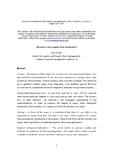- CERES Home
- →
- School of Management (SoM)
- →
- Staff publications (SoM)
- →
- View Item
JavaScript is disabled for your browser. Some features of this site may not work without it.
| dc.contributor.author | Smart, Alan | - |
| dc.date.accessioned | 2012-06-18T23:03:46Z | |
| dc.date.available | 2012-06-18T23:03:46Z | |
| dc.date.issued | 2008-01-01T00:00:00Z | - |
| dc.identifier.citation | Alan Smart, eBusiness and supply chain integration, Journal of Enterprise Information Management, 2008, Volume 21, Issue 3, Pages 227–246. | |
| dc.identifier.issn | 1741-0398 | - |
| dc.identifier.uri | http://dx.doi.org/10.1108/17410390810866619 | - |
| dc.identifier.uri | http://dspace.lib.cranfield.ac.uk/handle/1826/7245 | |
| dc.description.abstract | Purpose - The purpose of this study is to examine how four large organisations have approached the implementation of new eBusiness mechanisms: namely online order processing, eProcurement, reverse auctions, and a private exchange. The objectives are to establish whether supply chain integration is an identified goal for the firms involved and to evaluate the extent of integration achieved through these projects. Design/methodology/approach - A case study approach is used, with four separate cases being examined, leading to cross-case analysis and conclusions. The primary form of data collection was interviews with managers participating in the implementations. In order to measure the degree of supply chain integration pertaining in the examples, two frameworks from the literature are used. Findings - In three of the cases it is established that there is very little, or nil integration at supply chain level and only in one case is there evidence of a supply chain perspective contributing to the project. Three of the firms did not consider the supply chain implications of implementing their eBusiness applications. Research limitations/implications - The article builds on previous studies and illustrates the problems of achieving integration in the supply chain. Further research is needed to establish common attributes relating to supply chain integration. Practical implications - Three of the projects examined here were based predominantly on a business case for the implementing firm only. Firms need to be aware that IT projects by their trading partners may have supply chain cost implications for their own business. Originality/value - Whilst much of the literature propounds the need for integration, leading to extension of the supply chain concept, firms are pursuing IT implementations which are premised solely on internal benefits. The research illustrates that, if the new eBusiness mechanisms are to support wider supply chain goals, then the focal firms involved must take a more holistic view of how and why such solutions are implemented. | en_UK |
| dc.publisher | Emerald Group Publishing Ltd. | en_UK |
| dc.publisher | Emerald Group Publishing Limited | |
| dc.title | eBusiness and supply chain integration | en_UK |
| dc.type | Article | - |
Files in this item
This item appears in the following Collection(s)
-
Staff publications (SoM) [1258]
